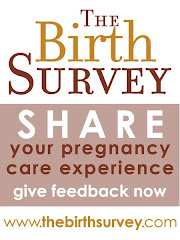I am pleased to have a guest post today from blogger and activist,
Anna Guthrie. (I am accepting guest posts for this blog while I'm on maternity leave--feel free to
email me with your ideas!)
-------
American Childbirth CultureA couple of months ago, Molly posted some
great thoughts about “why” all of this (childbirth/midwifery education) is so important, especially considering that so many people don’t seem to want to change the way things are. That’s the number one question I’ve pondered in all my years of “activism” for normal, natural, or “physiological” birth (as I’ve heard it called most recently).
The next most interesting question I’ve heard is one that has been asked me by many women: “What is so wrong with the [medically dominated] way I gave birth?” The first couple of times, it took me by surprise since I had never said that nor was meaning to be offensive at all in expressing my opinion. I also had no good answer-I’d think, what’s wrong with what’s considered “normal” childbirth in our country? Everything! Where should I start?! But, then I realized that these women were not just asking a question, they were on the defensive…immediately, without even hearing a word I said and they were the ones who had asked me. They had initiated the conversation about birth with a sincere desire to know what I had to say, but couldn’t get beyond their own births. That’s when it hit me…
This is all about our American childbirth culture-it goes deeper than all the statistics and conferences and symposiums. (Although I realize that those things are essential, and thank goodness there are so many people out there doing their part to create a change). I realized I’m interested in the psychological aspect of a woman’s relationship to birth, how the dynamics of our cultural history has shaped that, and how that can be changed.
The medical world that dominates childbirth in this country as well as the social and cultural environment we are born into teaches us from a young age to trust it without question. I just saw a billboard on the side of the freeway in Emeryville, CA (the first of many similar ones now being used by different hospitals). It features a picture of a happy, carefree woman, dressed in a flowing blouse, half-reclined in the grass so that her pregnant belly is obvious, and smiling at her little toddler on her lap. It reads, "Kaiser Permanente...DELIVERS". I couldn’t believe it-anyway, I thought MOTHERS delivered babies J-it’s almost as if they are purposely launching a counter-attack on any recent progress in childbirth education, natural birth, home birth, and midwifery! This is the hold the medical world has on our society. There is so much damage to undo here that it's hard to know where to start.
A woman’s birth is so personal to her and that’s one thing that drives many women to question and reject the status quo; but, it also works against those efforts. So many women give birth without ever hearing anything about this and they never have the opportunity to make a different choice. So that personal relationship to their birth is so sensitive-even more than they comprehend-that they don’t want to know what they are missing, or missed. So, we need to come full circle: instead of girls growing up within this false belief system of “medicalized” childbirth and then trying to shift their paradigm as adults, we need to work to change our culture from the ground up. Girls (and boys) should grow up understanding birth from the healthy perspective of natural, physiological birth being the ideal and medical intervention as merely the benefit of living in the 21st century and out of necessity or personal choice. So, that brings us back to the ultimate question, “why?”… So that the joy of childbirth can be fully experienced by everyone in our society because it is naturally woven into the fabric of our culture.
--
Anna Guthrie is a mother of three, homemaker, artist, and childbirth education activist. http://americanchildbirthculture.blogspot.com/






